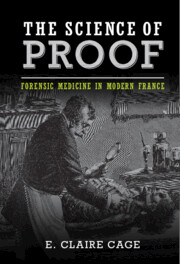Book contents
- The Science of Proof
- Studies in Legal History
- The Science of Proof
- Copyright page
- Contents
- Figures
- Acknowledgments
- Introduction
- 1 The Science of Death
- 2 Poisoning and the Problem of Proof
- 3 Deception and Detection
- 4 Reproductive Bodies and Crimes
- 5 The Forensics of Sexual Crimes against Children
- Conclusion and Epilogue
- Notes
- Bibliography
- Index
2 - Poisoning and the Problem of Proof
Published online by Cambridge University Press: 25 August 2022
- The Science of Proof
- Studies in Legal History
- The Science of Proof
- Copyright page
- Contents
- Figures
- Acknowledgments
- Introduction
- 1 The Science of Death
- 2 Poisoning and the Problem of Proof
- 3 Deception and Detection
- 4 Reproductive Bodies and Crimes
- 5 The Forensics of Sexual Crimes against Children
- Conclusion and Epilogue
- Notes
- Bibliography
- Index
Summary
Medicolegal experts often struggled to discern whether a suspicious death was caused by poisoning or natural causes, particularly during cholera epidemics, and faced difficulties in detecting traces of poison in cadavers. Changing understandings of the absorption of poisons in the body and the advent of new techniques, including the Marsh apparatus test, presented possibilities for demonstrative evidence of poisoning and revealed the dangers of flawed forensic expertise. Some doctors, scientists, jurists, writers, and other commentators issued warnings about the high sensitivity of the Marsh test, the possibility of numerous sources of contamination, and the problem of incompetent practitioners operating beyond the bounds of their knowledge and training. Nonetheless, the prevalence and nature of poisonings shifted over the course of the nineteenth century, largely in response to the evolution of scientific knowledge. However, public battles over the state of scientific and medical knowledge in poisoning trials raised concerns that the very means by which forensic doctors sought to establish their authority might undermine it.
- Type
- Chapter
- Information
- The Science of ProofForensic Medicine in Modern France, pp. 45 - 78Publisher: Cambridge University PressPrint publication year: 2022

